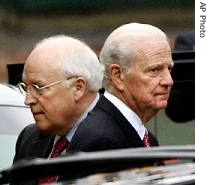2006年VOA标准英语-Iraqis Ambivalent About US Study Group Report(在线收听)
By Margaret Besheer
Irbil
04 December 2006
For weeks, the American media has been buzzing about the impending recommendations of the Baker-Hamilton Commission on changing strategy in Iraq. But Iraqi media and people in the street have hardly heard of the commission and show little enthusiasm for its report, to be released this week. Margaret Besheer has more from Northern Iraq.

Former Secretary of State James Baker, co-chairman of Iraq Study Group, walks past with Vice President Dick Cheney, after meeting with President Bush, 13 Nov 2006
Wednesday, the bipartisan U.S. panel led by former U.S. Secretary of State James Baker and former Democratic Congressman Lee Hamilton, will publish its recommendations.
It is expected to recommend withdrawing half of America's 144,000 troops from Iraq, by early 2008. The panel is also expected to urge direct talks between the United States and Iran and Syria, which would be a major American policy shift.
But Iraqi media have made little or no mention of the upcoming report, despite the fact that its recommendations could have a major impact on this country and the direction of the war.
Nouzad Hanna, a journalist with Iraq's state-run television, reacts with surprise when an American reporter tells him about the work of the Iraq Study Group and its report.
He begins scribbling notes furiously and is eager to call his editors with the news.
He says this is the first he has heard about the commission. He says the Iraqi media does not know about it and has not reported on it.
The Iraq Study Group has not been widely discussed in Iraqi media, but pan-Arab media, such as al-Jazeera television, has picked up on it, running a segment Sunday night on the commission's upcoming report.
On the streets of Ainkawa, an Arab Christian town in the north, nobody had heard of the Iraq Study Group.
Georges, an elderly man playing dominoes with friends at a café, says he has not heard about the report, either on the radio or in the newspapers.
Down the street, Ronnie, standing outside his small grocery store, says has not heard about the commission either, adding, he does not have time to listen to the radio, because he is too busy in his shop.
Political Science professor Mehdi Jaber Mehdi, who teaches at Salahedin University in Irbil, says the average Iraqi is unlikely to care about the Iraq Study Group report, because their daily lives are so difficult.
Professor Mehdi, who is originally from Baghdad, says, because the situation is so critical, Iraqis have lost faith in politicians, be they Iraqi, American or from the region, as well as for anything like the work of the Baker-Hamilton commission.
The commission is expected to recommend that the United States engage Iran and Syria on Iraq.
Nabil, an Iraqi engineer who has heard about the commission and its work, approves of this idea.
"I'm personally very much in favor of that," he said. "I believe that war will never solve anything. I believe that dialogue has got to persist. I believe that it is always worth giving it a try."
The panel is also expected to recommend the withdrawal of up to half of America's troops by early 2008 and a switch from combat operations to mostly training and support.
Omar, who is delivering candy bars to a grocery shop in Ainkawa, says he thinks such a move would be good for Iraq, because then Iraqis could provide their own security.
Whether Iraqis know about the work of the Baker-Hamilton Commission or not, they could see the impact of its recommendations, in the coming months.